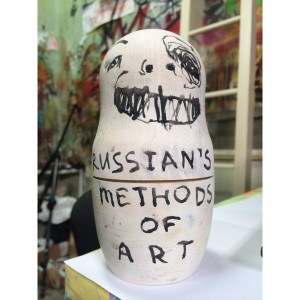I would feel strange if there was no reaction to my work, because art happens in public. About all the books that have been published. I always thought, it is not a good idea, because usually there’s no reaction to books. I’m really glad that this little book Was tun? [What to do?] which I wrote, caused extremely differing reactions and a lot of hate was raised. Especially, with the taz newspaper… Quite a lot of subscribers even canceled their subscription. So this made me extremely happy. Before, I had been a bit afraid of a large overall agreement about whether it is good or bad, whatever. There are totally different opinions. However, I thought: Oh, one may still evoke quite a lot just with a small book. Anyway the theater strangely seems most suitable for this. I think a lot about the audience: what is presented must make sense in society. People need to understand what happens and the portrayal must be convenient. As I said, in the film version of the material, I often integrate the reactions of the audience. Let us for example focus on a movie like City of Change, which is about a project in Switzerland. First there were death threats. After that this media campaign and then the St. Galler Parliament asked the theater to cancel the project. St. Gallen is a city in Switzerland. The project was canceled but we realized the same project under a different name. I always thought that was a good joke but no one else noticed it. There was an initiative against the project because in the center of the project was the petition for a right for foreigners to vote. The SVP [Swiss National Party] said: This is a public cultural production and with these funds, political work that belongs clearly to a political party shouldn’t be funded. But the people rejected the cuts of subsidies. And then we made the project. Nevertheless, there was the usual headwind. In the end the movie is actually almost about this reception – the reactions more or less. It would be interesting to make a similar film, for example, about Breivik. However, the movie turned out to be only his speech. It is quite nice that the film has two levels of sound. One microphone recorded the audience, and the other recorded what happened on stage. Both levels were mixed together. It is actually quite nice because in one production we recorded people who were shouting or yawning or laughing out loud. The entire situation is shown here.
(Excerpt from Breivik’s declaration): I cannot see my fault in it. I acted on the principle of the state of emergency. On behalf of my people, my culture, my religion, my city and my country. I ask, therefore, to be acquitted of all charges.
Mir wäre unwohl dabei, da Kunst eine öffentliche Arbeit ist, wenn es keine Reaktion darauf geben würde. Diese ganzen Bücher, die da publiziert worden sind, dachte ich immer, das ist eigentlich nicht so eine gute Idee, weil es auf Bücher meistens keine Reaktion gibt. Jetzt bin ich total froh, dass dieses kleine Büchlein „Was tun“, das ich geschrieben habe, extrem unterschiedliche Reaktionen und natürlich wieder ganz viel Hass hervorgerufen hat. Also, vor allem in der Publikation in der taz. Wo dann auch ganz viele ihre Zeitung abbestellt haben. Also das hat mich irgendwie total gefreut, weil ich hatte ein bisschen Angst, dass sich alle einig sind. Das ist gut oder schlecht, es ist was auch immer. Und es gibt total unterschiedliche Meinungen. Und da dachte ich irgendwie: Aha, man kann auch mit einem Büchlein vielleicht noch etwas hervorrufen. Das Theater ist aber komischerweise am geeignetsten dafür. Ich denke sehr stark an Zuschauer. Dass das was getan wird, gesellschaftlich Sinn macht. Dass die Leute verstehen was geschieht. Und dass die Darstellung gut ist. Wie gesagt, in Filmfassungen nehme ich oft die Reaktionen mit rein. Also wenn wir jetzt einen Film nehmen wie „City of Change“, das war über ein Projekt in der Schweiz. Das erste Mal gab es Todesdrohungen und dann diese Medienkampagne und dann hat das St. Galler Parlament das Theater gebeten das nicht zu machen. St. Gallen ist eine Stadt in der Schweiz. Dann wurde es abgesagt. Wir haben dann das gleiche Projekt unter einem anderen Namen laufen lassen. Wir haben quasi einfach den Namen gewechselt. Ich fand das immer einen guten Witz, den hat aber außer mir niemand bemerkt. Da gab es dann eine Initiative wegen des Projekts, weil im Zentrum eine Petition für das Ausländerstimmrecht stand und wiederum die SVP gesagt hat: Das ist öffentliche Kulturförderung. Man kann keine politische Arbeit damit finanzieren, die klar parteipolitisch ist. Dass diese Subventionen gekürzt werden, wurde aber vom Volk abgelehnt. Und dann haben wir das Projekt gemacht und dann gab es dann immer noch den üblichen Gegenwind. Von allen möglichen Seiten. Und der Film handelt eigentlich fast nur von dieser Rezeption. Es wäre interessant zum Beispiel über Breivik einen ähnlichen Film zu machen. Da besteht der Film tatsächlich nur aus dieser Rede. Was da eigentlich ganz hübsch ist, dass der Film zwei Tonebenen hat. Das eine ist, dass wir es für ein Publikum aufgenommen haben und das andere ist das, was auf der Bühne gesagt wird. Und das wird zueinander gemischt. Und das ist eigentlich ganz hübsch. Weil die Leute dann in der einen Inszenierung, die wir aufgenommen haben, reinrufen oder gähnen oder laut lachen. Und da wird eigentlich so ein bisschen die Situation gezeigt.
(Ausschnitt aus Breiviks Erklärung) Ich kann darin keine Schuld erkennen. Ich habe nach dem Grundsatz des Notrechts gehandelt. Im Namen meines Volkes, meiner Kultur, meiner Religion, meiner Stadt und meinem Land. Ich verlange daher von allen Vorwürfen freigesprochen zu werden.

















